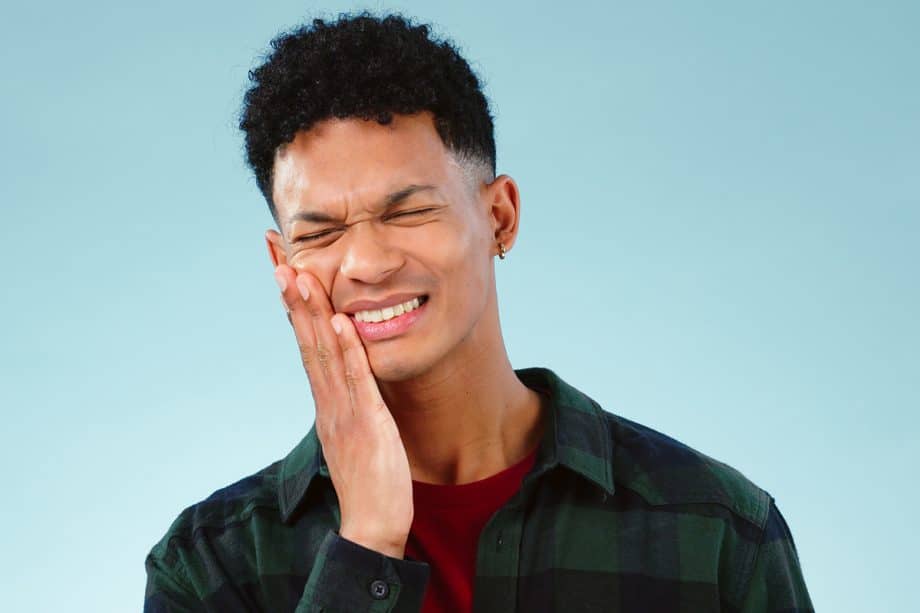Are you experiencing pain or tenderness in your jaw, chronic headaches, or a clicking sound when you open and close your mouth? Then you may be living with a TMJ disorder. TMJ disorders are quite common, affecting between 12 to 30 million American adults. TMJ disorders are more common in women than in men, and tend to pop up more in young and middle-aged adults between ages 20-40. Let’s dive into what TMJ disorders are, how they are treated, and who you should call if you are having TMJ disorder symptoms.
What are TMJ Disorders?
TMJ disorders are a collection of over 30 conditions that cause issues with the temporomandibular joint, abbreviated TMJ. The TMJ attaches the lower jawbone to the skull on both the right and left sides (i.e. everyone has two TMJs, one on each side of the skull). While many people may mistakenly refer to problems with these joints as just TMJ, it is actually more correctly called TMD, or temporomandibular joint disorder. No matter what you call it, TMJ disorders can cause significant pain and loss of function for sufferers, especially during dreaded flare-ups, when symptoms increase suddenly. TMJ disorder symptoms include pain and tenderness in the TMJs, pain around the ear(s), pain while chewing, facial pain, popping or clicking of the TMJs as the mouth is opened and closed, headaches, muscle spasms, neck and shoulder pain, jaw and facial swelling, and even migraines in certain cases. While it can be difficult to pinpoint the exact cause of a TMJ disorder, going to see the proper medical professional is the first step in getting relief.
TMJ Disorder Treatment: Dentist or Doctor?
Many patients find themselves confused when trying to decide who to call about TMJ disorder problems…dentist or doctor? While each medical professional has their strengths when dealing with these common disorders, only a dentist will have the intimate knowledge of the structure and function of the jaw necessary to treat TMJ disorders effectively. In fact, most primary care doctors will refer patients to a dentist who specializes in TMJ disorder treatments instead of attempting treatment themselves.
Benefits of Using a Dentist for TMJ Disorder Treatment
As mentioned above, dentists receive extensive education and training in the structure and function of the jaw and the joints which attach it to the skull. This allows them to more accurately identify the cause of the TMJ disorder symptoms and develop an effective treatment plan. Furthermore, a dentist will have the expertise to treat other issues caused by the TMJ disorder symptoms, such as tooth and bone damage due to jaw clenching, bite misalignments, and teeth grinding. At the end of the day, a dentist’s specialized focus on the jaw anatomy makes them the best choice for TMJ disorder treatment.
Potential Treatments for TMJ Disorder Symptoms
Treatments for TMJ disorders depend on the symptoms presented, severity of symptoms, and any co-existing issues. The dentist will typically begin with the least invasive treatment options and slowly work their way through to the more invasive treatments, such as surgery. Popular treatments for TMJ disorder symptoms include:
- Rest
- Jaw exercises
- Soft diet
- Improved posture
- Alternating hot and cold packs
- Over-the-counter pain medications
- Custom-fit mouthguards
- Physical therapy
- Trigger point therapy
- Electrical stimulation
- Muscle relaxers
- Arthrocentesis
- TMJ arthroscopy
- Open-joint surgery
No two TMJ disorder treatment plans will be exactly alike, as they are developed taking the patient’s specific needs and circumstances into consideration. By exploring the various treatment options for TMJ disorders, the dentist can pin down the exact combination of treatments to most effectively treat a patient’s TMJ disorder symptoms.
Frequently Asked Questions About TMJ Disorders
What causes TMJ Disorders?
TMJ disorders have several potential causes, which vary from patient to patient. Some of the most common causes of TMJ disorders include stress, dehydration, hormone changes, injury to the jaw area, poor posture, repetitive jaw movements, vitamin deficiencies, and certain medications.
Are TMJ Disorders Curable?
Most cases of TMJ disorder resolve with minimal treatment over a few weeks or months. However, for severe cases of TMJ disorder, more invasive treatments may be required. In some cases, symptoms never fully subside, so the treatment plan focuses more on day-to-day management of symptoms and preventing symptoms from becoming worse.
TMJ Disorder Treatment on Florida’s Treasure Coast
If you’re one of the millions of Americans who suffers from TMJ disorders, help is available. You don’t have to live with debilitating and painful TMJ disorder symptoms that diminish your quality of life. At Stuart Prosthetic Dentistry in Stuart, Florida, we are experts at treating even the most severe cases of TMJ disorder. Start living your best, pain-free life with qualified and compassionate TMJ disorder care on Florida’s gorgeous Treasure Coast. Schedule an appointment with us by calling 772.286.1606, emailing us, or having your primary care physician refer you to our practice.

